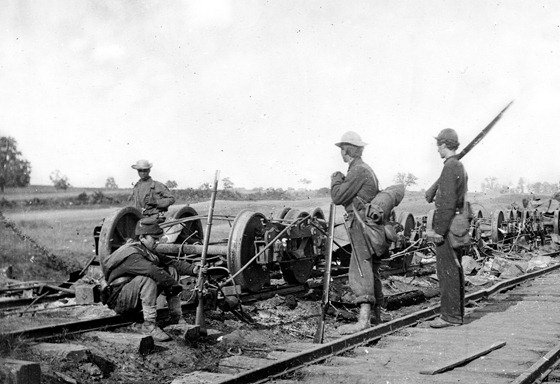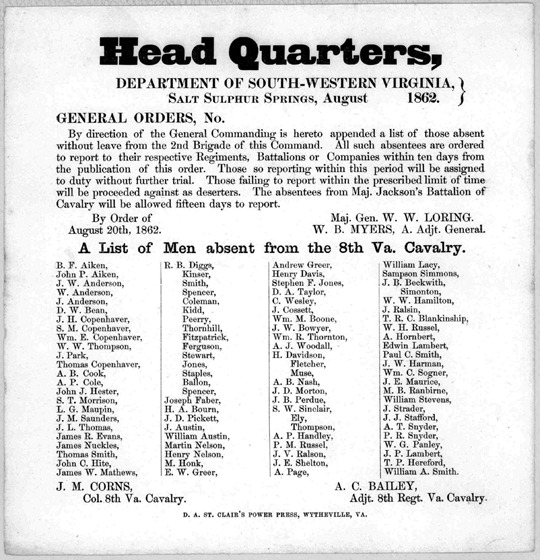AUGUST 20TH.—We have now a solution of the secret of Pope’s familiarity with the country. His guide and pilot is the identical Robt. Stewart who was sent here to the Provost Marshal—a prisoner. How did he get out? They say money did it.
Monday, August 20, 2012
Manassas Junction, Va. Soldiers beside damaged rolling stock of the Orange & Alexandria Railroad; photograph taken by Timothy H. O’Sullivan.
Library of Congress image.

“After an hour’s halt the column marched three miles northeast of the town, passing over the battlefield, where Haincock gained renown.” –Diary of Josiah Marshall Favill.
August 20th. At 7 A. M. were en route again, and at noon entered the ancient city of Williamsburg, halting just on the outskirts of the town. Colonel Parisen, Doctor McKim, and I rode over the place, which is interesting on account of its antiquity and the college buildings; the bricks used in the buildings were sent over from England; they are very plain and substantial, but not particularly imposing; there are many quaint colonial houses now deserted on streets that are grass grown, and save for a few chattering darkies, utterly deserted. Melancholy, indeed, is the fate of this once flourishing town, now simply a monument of past generations. After an hour’s halt the column marched three miles northeast of the town, passing over the battlefield, where Haincock gained renown. The earthworks are still standing, just as the rebels left them, except that nature, always generous, has spread a graceful mantle of green about them, making them look less suspicious to the soldier’s eye.
(click on image to view larger version)
Head Quarters,
DEPARTMENT OF SOUTH-WESTERN VIRGINIA,
Salt Sulphur Springs, August……….1862.
GENERAL ORDERS, No.
By direction of the General Commanding is hereto appended a list of those absent without leave from the 2nd Brigade of this Command. All such absentees are ordered to report to their respective Regiments, Battalions or Companies within ten days from the publication of this order. Those so reporting within this period will be assigned to duty without further trial. Those failing to report within the prescribed limit of time will be proceeded against as deserters. The absentees from Maj. Jackson’s Battalion of Cavalry will be allowed fifteen days to report.
By Order of
August 20th, 1862.
- Maj. Gen. W. W. LORING.
- W. B. MYERS, A. Adjt. General.
- A List of Men absent from the 8th Va. Cavalry.
- B. F. Aiken,
- John P. Aiken,
- J. W. Anderson,
- W. Anderson,
- J. Anderson,
- D. W. Bean,
- J. H. Copenhaver,
- S. M. Copenhaver,
- Wm. E. Copenhaver,
- W. W. Thompson,
- J. Park,
- Thomas Copenhaver,
- A. B. Cook,
- A. P. Cole,
- John J. Hester,
- S. T. Morrison,
- L. G. Maupin,
- J. M. Saunders,
- J. L. Thomas,
- James R. Evans,
- James Nuckles,
- Thomas Smith,
- John C. Hite,
- James W. Mathews,
- R. B. Diggs,
- Kinser,
- Smith,
- Spencer,
- Coleman,
- Kidd,
- Peerry,
- Thornhill,
- Fitzpatrick,
- Ferguson,
- Stewart,
- Jones,
- Staples,
- Ballon,
- Spencer,
- Joseph Faber,
- H. A. Bourn,
- J. D. Pickett,
- J. Austin,
- William Austin,
- Martin Nelson,
- Henry Nelson,
- M. Honk,
- E. W. Greer,
- Andrew Greer,
- Henry Davis,
- Stephen F. Jones,
- D. A. Taylor,
- C. Wesley,
- J. Cossett,
- Wm. M. Boone,
- J. W. Bowyer,
- Wm. R. Thornton,
- A. J. Woodall,
- H. Davidson,
- Fletcher,
- Muse,
- A. B. Nash,
- J. D. Morton,
- J. B. Perdue,
- S. W. Sinclair,
- Ely,
- Thompson,
- A. P. Handley,
- P. M. Russel,
- J. V. Ralson,
- J. E. Shelton,
- A. Page,
- William Lacy,
- Sampson Simmons,
- J. B. Beckwith,
- Simonton,
- W. W. Hamilton,
- J. Ralsin,
- T. R. C. Blankinship,
- W. H. Russel,
- A. Hornbert,
- Edwin Lambert,
- Paul C. Smith,
- J. W. Harman,
- Wm. C. Sogner,
- J. E. Maurice,
- M. B. Ranbirne,
- William Stevens,
- J. Strader,
- J. J. Stafford,
- A. T. Snyder,
- P. R. Snyder,
- W. G. Panley,
- J. P. Lambert,
- T. P. Hereford,
- William A. Smith.
- J. M. CORNS,
Col. 8th Va. Cavalry. - A. C. BAILEY,
Adjt. 8th Regt. Va. Cavalry.
D. A. ST. CLAIR’S POWER PRESS, WYTHEVILLE, VA.
Broadsides, leaflets, and pamphlets from America and Europe
Auguet 20.—British subjects who had declared their intentions to become citizens of the United States, being apprehensive that they might be drafted into the militia, Secretary Seward informed them, through the British Charge d’ Affairs at Washington, that none but citizens were liable to military duty in the United States.— Secretary Seward’s Letter.
—E. Kirby Smith, the rebel General, from his headquarters in East-Tennessee, issued the following address to the citizens of Knox County, and the adjacent counties in Kentucky:
“Finding that you have been deceived by the misrepresentations of our enemies, and have been induced by them not only to leave your homes, but also to resort to the cowardly practice of bushwhacking, I now promise you that, if you return quietly to your homes and lead orderly lives, you will not be disturbed, but will be protected in your rights.
“If, on the contrary, you persist in firing upon my soldiers from the woods, you will be hung when you are caught, and your houses and property will be destroyed.”
—To-day the Union army, under Gen. Pope, reached the Rappahannock River, in its retreat from the Rapidan, closely followed by the rebel army, under Gen. Lee. At Brandy Station the two armies came within sight of each other, and the rear-guard of the Nationals, supposing the advance of the rebels to be a mere skirmishing party, turned for the purpose of driving them back; but on charging upon them, they discovered their error, for after receiving two or three volleys, which thinned their ranks considerably, they retreated to the bridge at the station, closely pursued by the rebels. Here the Unionists were supported by two batteries of artillery, which opened fire on the rebels with great effect, compelling them to fall back undercover of the adjacent woods.— (Doc. 104.)
—A fight took place at Edgefield Junction, Tenn., between a small number of the Fiftieth Indiana volunteers and a superior force of rebel guerrilla cavalry belonging to Col. John H. Morgan’s command, resulting in a retreat of the latter, with a loss of seven men killed and twenty wounded.
—A fight took place near Union Mills, Mo., between a force of National troops, under the command of Major Price, and a party of rebel guerrillas. The Nationals did not discover the rebels until they were fired upon from an ambush; but, notwithstanding this disadvantage, they charged upon them and put them to flight, capturing sixteen horses, a number of guns and swords, and a quantity of lead and powder. Four of the rebels were taken prisoners and one killed. Four of the Union party were killed and three wounded.—St. Louis Democrat, August 23.





